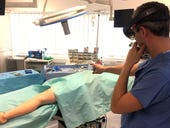Latest from Jo Best
- Sort by: DATE
- Type: ALL
-
Topic:
DIGITAL HEALTH .
-
- NETWORKING
- MOBILITY
- HARDWARE
- SECURITY
- DEVELOPER
- TECH INDUSTRY
- ENTERPRISE SOFTWARE
- TELCOS
- HEALTH
- INNOVATION
- MICROSOFT
- APPLE
- CXO
- MOBILE CARRIERS
- GOVERNMENT: UK
- GOVERNMENT
- GOVERNMENT : UK
- TECH & WORK
- CLOUD
- SMARTPHONES
- UNITED KINGDOM
- INTERNET OF THINGS
- EU
- FINANCE
- LEGAL
- AI & ROBOTICS
- INTEL
- BIG DATA
- BLACKBERRY
- SOCIAL MEDIA
- STARTUPS
- TABLETS
- COLLABORATION
- DATA CENTERS
- PROCESSORS
- SERVERS
- MOBILE OS
- WINDOWS
- 3D PRINTING
- OPEN SOURCE
- IPHONE
- DIGITAL HEALTH AND WELLNESS
- LINUX
- STORAGE
- AR + VR
- GOVERNMENT : AU
- GOVERNMENT: AU
- GOVERNMENT: US
- HEWLETT PACKARD ENTERPRISE
- IBM
- ROBOTICS
- SAMSUNG
- AFTER HOURS
- AMAZON
- ARTIFICIAL INTELLIGENCE
- ASEAN
- INDIA
- LAPTOPS
- SAP
- SOCIAL ENTERPRISE
- IOS
- Load more
-
- Date: ALL



